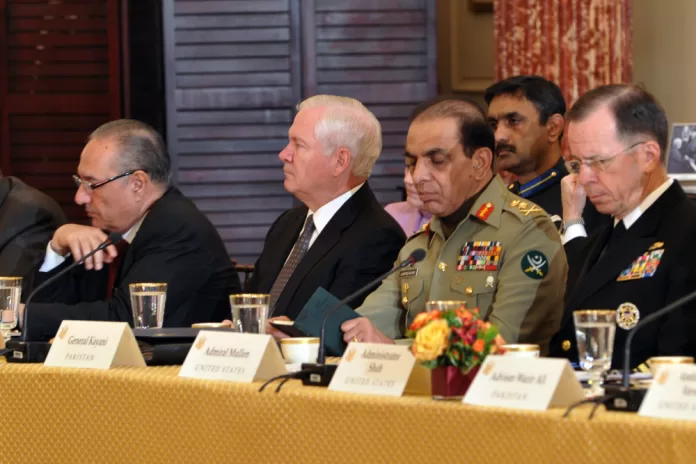Due credit must be given to US Vice-President Joseph Biden, as a US Senator he was the first high-ranking US functionary to recognise the rank injustice done to Pakistan over the years. US decision-makers, led by Secretary of State Hilary Clinton, were unanimous in recognising Pakistan’s crucial role as the centre of gravity to resolve the biggest US headache at present, Afghanistan. Taking stock of the initiatives taken as a result earlier this year is a moot point, what was more important for the present Round was to not only build upon the successes but contain the irritants that threaten to derail the progress. The earlier Dialogue had been more even-handed then ever before in the last decade, this because of the pragmatic and even-handed review ordered by US President Obama.
Nations must hold their own interests uppermost, compromise comes only in exceptional circumstances. The US has its own core national interests, so does Pakistan. To believe that the US will tailor its “national security objectives” to dovetail with Pakistan’s core interests is naïve, and dangerous. In reverse, for the US to believe the same would not be realistic, this would also be difficult given that we do not have a coherent “national security strategy”. However, narrowing down the gaps is possible. Despite Pakistan always being in a position to drive a hard bargain, successive military dictators sold Pakistan short at the negotiating table to ensure their own survival. That selfish failure undercut Pakistan’s core national interests. Our present democratic rulers seem to pursue the same narrow self-centered objectives, that is probably why Kayani has been part of Pakistan’s team to the Dialogue this year, to ensure no one sells the kitchen sink.
The generous US support has unfortunately not been enough, neither economically and certainly not in military aid. Pakistan is getting only a fraction of what it should get, comparatively Afghanistan gets far more for doing far less. Instead of doling out aid, the US must give us viz (1) our legitimate transit dues and (2) market access for our cotton textile and manufactures thereof. The annual $ 1.5 billion largesse of the Kerry-Lugar Bill (KLB) must not be frittered in schemes that will disappear into the public memory not long after most of the money has disappeared into the pockets of consultants and go-between NGOs. The US must target major projects, such as dams, power stations, hospitals, roads and ports like Gwadar and Pasni, as well as north-south road and rail communications. Pakistan needs short-term and long-term help. (1) one-time help to overcome circular debt, (2) rental power plants, (3) nuclear plants, and (4) water and hydel power (projects), Basha, etc.” Financial support must also target (1) effective policing for better law-and-order enforcement, (2) job creation, with emphasis on the IT sector, (3) agriculture promotion in order to double the yield in five years, (4) effective healthcare, and (5) developing the railways as the transportation backbone to reduce freight charges.
The magnificent counterinsurgency operations (COIN) conducted by the Pakistan’s Armed Forces has changed the equation, but at great human and material cost. The US can stay on top of the game in Afghanistan, and the region, by placing far more bets on the proven successful formula, the Pakistan Army and Pakistan. The quality of the equipment of the Pakistani Armed Forces must be upgraded for prolonged counterinsurgency operations, particularly of the Frontier Corps, concentrating mainly on providing training, helicopters, night-vision devices and armoured vehicles.

An independent Counter Terrorist Force (CTF) must be tasked with countering (and only countering) terrorism. Clear guidelines must restrict it being used for political purposes. The US Department of Defense (DOD) has an office called SOLIC (Special Operation and Low Intensity Conflict) with an office called CN (Counter Narcotics) whose funding is authorized directly by Congress. After 9/11, DOD mandated Congress authority to use CN funds for counter-terrorism purposes, justified by the nexus between terrorist and insurgent groups (macro-terrorism) and their funds-raising from narcotics trafficking. I repeat ad nauseam, why not convert the anti-Narcotics Force (ANF) with an existing nucleus into a full fledged CTF and the “Ministry for Narcotics Control” into the “Ministry for Narcotics Control and Counter-Terrorism”?
Does it serve US interests to publicly castigate Pakistan to “do more”? This in the face of military and civilian casualties that we are suffering, 10 times more than the US, coalition and Afghans all put together? To quote a Chinese proverb, “do not use a hammer to remove a fly from a friend’s forehead”. What good did the attack on the FC outpost serve, except to exacerbate an already tenuous relationship? The roads to peace (as well as war) literally goes through Peshawar and Quetta. Pakistan has more to lose because it cannot walk away from the region as the US has done before, peace is the only viable option. For the record, Pakistan will one day have to deal with North Waziristan, but only when it has the resources to do so, and not before.
Denying us cheap nuclear energy makes no sense except cause hardship for our people. The US must take steps to bring us out of the “nuclear cold”, giving us the same parity as in their nuclear relationship with India, that will be the acid test of a long-term meaningful relationship. A nuclear energy deal was thought to be discussed in Washington DC in March this year but nothing came of it, very disappointing that a US spokesman stated nothing that was on the table. There would be nothing more effective for a positive public perception about the US image in Pakistan than a nuclear deal.
The battlefield success could not have been possible without the democratic dispensation in Pakistan today, however ugly it may be. While one does concede that at times cold pragmatism has to take preference over ideals, corruption and fraud is unfortunately synonymous with the type of rulers the US seems to support. For the system to survive the US must lay down “red lines” in keeping with its own core values. While the US is right in supporting the democratic process in Pakistan, anti-US sentiment prevailing among the broad mass of the intelligentsia and the masses in Pakistan stems from the perception that to gain leverage in Pakistan, Americans cynically support pliable rulers who put their own survival and motives ahead of everything else. This support for the “singer rather than the song” has disfigured US policy the world over for more than half a century, the US must distinguish between supporting the system as opposed to an individual.
A comprehensive review of all relevant factors encompassing mutual interests in geo-politics and economics, crucial for the region’s stability, as well as for peace and prosperity in Pakistan, is necessary. While Pakistan is not equal to the US in the world, Pakistan’s greater stake in the region evens the balance of relationship. Who will fill the vacuum in Afghanistan when the US eventually leave, this sooner rather than later? Pakistan can fulfil that role, not as a US proxy but to ensure common national interests. An unequal partnership has an element of failure inherent and no amount of rhetoric can paper over the imbalances in such a relationship. The people of Pakistan must gain confidence that the US is genuine about sustaining a meaningful long-term relationship.
Courtesy: The News




